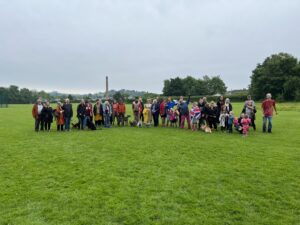MORE THAN MONEY – Hopes following Kevicc Lower Field Public Meeting
The very short summary: the opportunity for school and community to agree together something wonderful and vital for future generations by saving Kevicc Lower Field and using the Elmhirst building for the benefit of the community is a much bigger and more valuable goal than the opportunity the school has for a higher private bid than the council’s market value offer of £2.5 million for the plot. To take a big step towards that goal, the Why This Field campaign (with the Town Council if permitted) should be able to meet with the full board of 10 volunteer governors who will be deciding the future of the land, so that they get the full picture, not one limited to the views and reports of just the governors who attended the meeting, one of whom – the head governor – stated that the highest £££ bid has to be accepted. The Community and Kevicc engaging together on this is the way ahead.

As an observer at the meeting on Friday 17th June from 7pm about the future of Kevicc Lower Field in Totnes Civic Hall, I found it a very enlightening face to face exchange of information and differing opinions that remained just on the right side of civility, if passionate and angry at times.
It was extremely informative in showing the huge strength of feeling in the community to save the green space, as well as to support Kevicc to be able to make big advances in their modernisation plans, too.
It also helped to clarify where the rift is exactly and hopefully how progress can be made to heal it for the benefit of all.
Around 120 people had packed the hall well before the meeting was due to start, showing the real love for the green space felt by the local community.
The panel at the front comprised local campaigners to save the land Lisa Smallridge and Alice Widger, district councillor John Birch, ex-bookshop owner and ex-chamber of commerce chair Paul Wesley, Totnes Mayor Emily Price, ex Totnes MEP Caroline Voaden; and representing Kevicc: Head and governor Alan Salt, and head of Kevicc governors Jim Lodge.
Paul Wesley started the opening statements off by laying out the issue of the school planning to sell a number of parcels of land on the main site including the disputed Lower Field plot on the other side of the road. It’s this plot used by so many which has awoken the community response and which the Town Council have offered to buy. He called for a joint cooperative way forwards, with the school and community working together. John Birch went on to give us some useful historical and interesting legal points to consider.

Mayor Emily Price laid out the Town Council’s offer of £2.5 million pounds to buy the Lower Field plot, a sum decided by an independent survey, on a long-term government loan, which she confirmed once again can be repaid by income from the parking there.
The value of the green space and the Elmhirst building was made clear by the Mayor: as level playing-fields for all types of sports, a park, access to the river for many people, a green lung for the congested traffic-ridden town, a venue for learning a café-restaurant and so on.
Local lovers of the land and Why This Field campaigners Lisa Smallridge and Alice Widger spoke from the heart about how their families have enjoyed the vital “green lung” for generations and they hope for many more to come.
Kevicc Head and governor Alan Salt in his statement emphasised how much the school was in need of repair and new-build as a result of decades of underfunding: leaky rooves, pre-fabs from the early 70s and so on.
This led on to around an hour and a half of questions and points raised from the audience, chaired by Caroline Voaden, mostly directed at the two Kevicc reps.
Unanimously from the large community audience – including from District Councillor Jacqi Hodgson, from a school teacher, from a youth worker, from various parents of children at Kevicc, a local artist … – came repeated calls on Kevicc governors present along the lines of:
“Please listen to the community and accept the Town Council offer”,
“Please don’t just focus on trying to get more money”,
“Kids need green space, the rest of us too”,
“We absolutely understand the need for funding, but please take this much-loved green space out of the private sale and accept the Town Council offer”,
The Kevicc pair on the panel found complete support with their main basic point: We need money to improve the school.
It didn’t take long, however, right from the initial statements in fact, for it to start to become clear that there was a dividing line between the school’s desire to maximise profits and the community’s desire to save the land and develop the Elmhirst Building as treasured community assets.
Jim Lodge, head of the Kevicc governors, in his opening statement when trying to state as fact that the governors are obliged to accept the highest offer, in the same way shareholders’ interests have to be served, was very noticeably stopped in his tracks and fazed in the midst of making this claim when told “That is not true!” by one of the lead community campaigners Dr Kevin Burchell. He then forgot his pre-planned speech when trying to go back to it, which drew more attention right from the off to feelings on this vital fault-line issue which reverberated through the rest of the meeting: the community bid should certainly rank higher among governors than pure money interests.
Also indicative of the same fault line were the intended-to-be ‘reassuring’ words of one of the governors sitting in the audience, who stood up to speak in order, he explained, to try to take some of the heat off the Kevicc pair on the panel. He assured the meeting that governors would give the Town Council offer just as much attention as other offers.
If this was what he thought was a pacifying ‘bone’ he was throwing to the meeting, it was met largely with derision and sarcasm from those around me.
What his words mean are that the overwhelming desire of the Totnes community as expressed by the large crowd of people at the meeting and by the ongoing campaign petition and survey to save the parcel of green space from private sale and from being concreted over will be judged by Kevicc governors as at best ‘just another offer’ in the coming bidding war, with final bids due in by late July.

That’s to say, no special status – unless, as campaigners hope, things change – is currently being awarded by Kevicc governors to this Totnes community bid fronted by the Town Council’s offer over and above the usual construction profiteers – sorry ‘developers’ – whose only interest is profit.
It came out later in the meeting that there are apparently two conflicting strands of legal advice that can be followed on this specific matter: one states that a community bid trumps private bids, but the head governor Jim Lodge was in disagreement.
The other position, which the three Kevicc governors who spoke at the meeting either openly aligned themselves with or at least hovered around, states that (I paraphrase) it is incumbent to only accept the highest bid, regardless of the community position. If the other Kevicc governors not present at the meeting are getting their advice from and following the lead of those who were present, which seems very likely given that those present included the Head teacher and governor, and the head of the governors, as well as another governor whose name I failed to catch, clearly the dominant if not unanimous view among them will be that they have to take the highest bid.
This is clearly a huge point that needs more investigation and discussion on both a legal and on a moral level.
Another closely related highly contentious topic raised was Mr Salt’s and the other governors’ hitherto alleged failure to engage. Totnes Councillor and Ex Mayor Ben Piper speaking with noticeable passion and frustration told how his and other Town Councillors’ efforts to call a meeting with the whole board of governors, the 10 volunteers who will be deciding the fate of the much-loved green space, were repeatedly left unanswered by those at Kevicc. He accused Kevicc head and governor Alan Salt of using “warm words” in the meeting to allay community concerns.
Mr Salt responded by saying some meetings with Town Council members had taken place.
The request for access by the Town Council to the whole board of governors who will make the decision, however, was not enabled, and as one of the bidders apparently legally they can’t now have that access, but the Why This Field campaign can to get across the community’s wishes.
Concerns were raised too about misrepresentation of how the community feel about the issue; Alan Salt had referred a number of times to the school’s consultation.
Dr Kevin Burchell, a professional researcher and a lead campaigner in the Why This Field campaign, made the point that the school survey was both unfit for purpose in that it amalgamates questions rendering them confusing, and poorly representative in only receiving 99 responses.
Dr Burchell went on to explain that the Why This Field campaign has created its own carefully written survey, which in a third of the time of the school’s has received around 500 responses and growing, and is 90% in favour of the school accepting the Town Council offer; with only 4% in favour of the school selling to a private builder.
Also raised repeatedly was the point that the land was gifted to the community by the Elmhirsts of Dartington. How then is it possible for Kevicc to sell it to construction profiteers? Despite the questionable ethics of this, Mr Salt said their lawyers had assured them it was legally legitimate for them to do so.
Another vital point was that if the school doesn’t remove the Lower Fields segment from the sale now, it will inevitably receive bids from construction firms that include it, attracted to it particularly for the ease of building on the level land – a key benefit for its use as a public park and sports area, too. This would make it much more of a painful wrench for Kevicc to later have to separate it from commercial bids already received by late July, so the hope among campaigners for Kevicc to remove the disputed area from the sale and accept the Town Council’s bid is very high.
At the close of a sometimes heated but ultimately very valuable and eye-opening ‘lively exchange of views’, Caroline Voaden, ex Totnes MEP, summed up for many the situation by expressing that “this is about more than money”, “we want our children to look back and thank us for saving this community space”, and that “surely we can do things differently here”.


